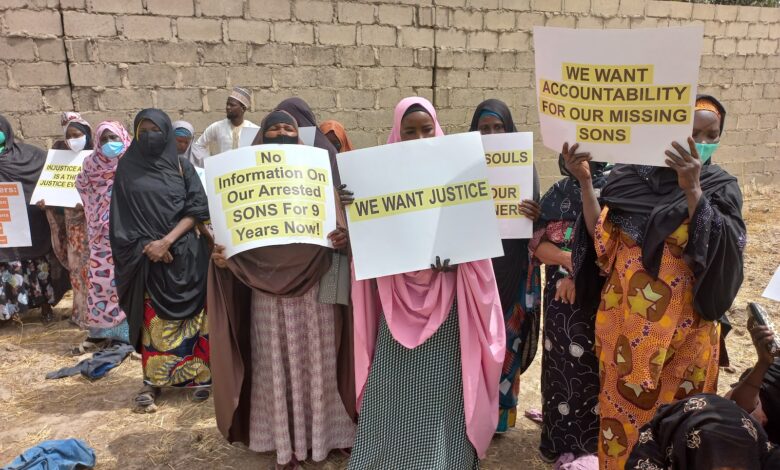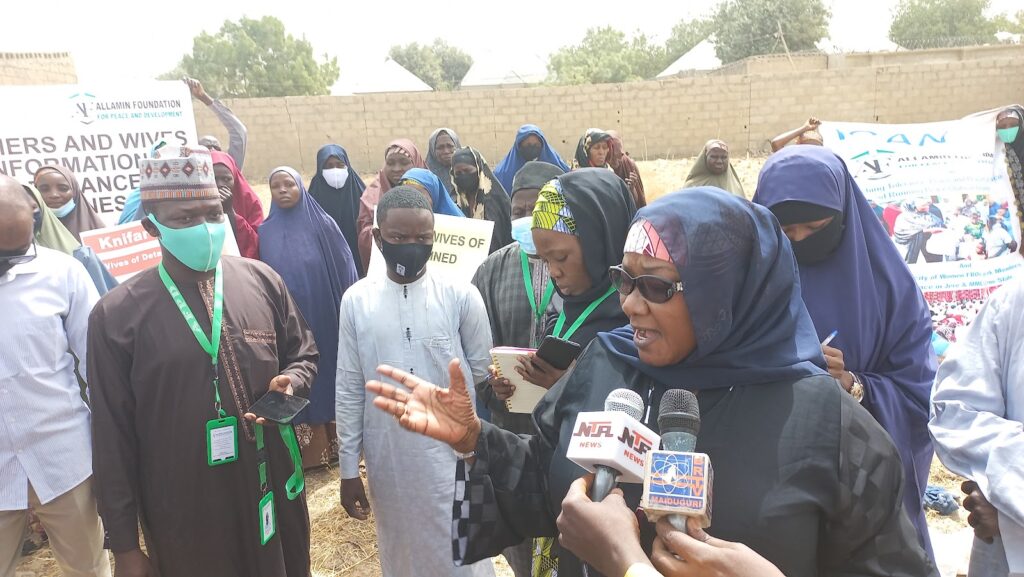Borno Women Demand Release Of Detained Relatives 8 Years After Giwa Barracks Attack
Eight years ago, a large number of armed Boko Haram terrorists attacked Giwa barracks in Maiduguri during which a military detention cell for suspected insurgents was broken. Since then many persons, especially those whose families insisted were innocent, could not be accounted for to date.

Hundreds of women, mostly aged mothers and wives, on Wednesday, March 14, called on the Nigerian gov’t and its military to release their male relatives arrested, about eight years ago, as Boko Haram suspects.
The women, organised under Jire Dole Network, said the military had mass arrested their male relatives, including husbands, sons and brothers, on purported allegations of complicity in Boko Haram activities between 2013 and 2014.
According to them, the majority of the detainees were held in underground bunker cells within the famous Giwa barracks where most of the detainees were last seen before Boko Haram attacked the facility on March 14, 2014.
It was on record that during the attack on Giwa barracks, the detention cell was compromised leading to the release of many of the detainees including top terrorists.
“Since the attack on Giwa barracks, we have lost contact with our loved ones, most of whom we believe were taken to the military barracks detention facility in Maiduguri; and most of them have gone missing at the height of the fight against Boko Haram,” said Hamsatu Allamin, who has been a leading voice in calling for justice to the affected women.
The women annually commemorate the March 14 Giwa barracks attack in honour of the day their husbands, sons and brothers were ‘wrongly’ arrested as Boko Haram accomplices.
In a response to the women’s persistence, the military has in the past years released over 3000 detainees having been cleared of all allegations.

“We are pleased to confirm that out of this number, we have found 450 out of the over 20,000 sons and husbands of our members of the Jire Dole Network,” Hamsatu told HumAngle.
Still, the women who had turned out en masse to protest the continued detention of their male relatives, insisted they deserve clarity from the government and its military commanders on the whereabouts of their beloved family members.
Women Narrate Ordeal
Most of the protesting women who narrated their ordeal of the past decade wondered why the government is giving amnesty to repentant Boko Haram while those detained as suspects still languish in unknown detention centres.
Fatima Hassan, a 65-year-old grandmother said she lost contact with her two sons since the morning soldiers stormed her home and took them away “for questioning.”
“My sons were not Boko Haram. Ibrahim Mohammed, was a staff of Fidelity Bank, and his younger brother, Abba had finished his diploma programme and was about to go for his degree programme at the time they came to pick them,” she told HumAngle.
“One of the soldiers, a man from Sokoto, told us as they were about to take them away that we should look for enough money to bribe his boss, Yellow so that they can free them. We looked for money but it was not enough and so, he refused to free them. The soldier who speaks Sokoto Hausa asked if my children can speak English and I told him that one of them works in the bank and the other one is a student – why won’t they understand English. He then said that I shouldn’t worry. That they would be released. But since then, I have never set my eyes on them to date,” she added.
Fatime said she was informed by a recently freed Boko Haram suspect that her sons are being detained in a prison facility in Kainji, Niger state.
“Some said they are alive and well in the Kainji Prison, that I should keep on praying for them. But I don’t know what to do. These boys are innocent and loving children. They have nothing to do with Boko Haram. They were picked in my presence while they were having their breakfast,” she said tearfully.
“I am begging the president and the chief of army staff, General Farouq Yahaya, to kindly release my children to me, they are innocent. They have been in detention for ten years now and since then I have not been myself. I have developed high blood pressure and have been depending on drugs,” Fatime added.

Hajjagana Suleiman, who is also in her 60s said her 25-year-old son was arrested based on a false accusation of being a Boko Haram accomplice ten years ago.
“For ten years now, I have gone all over the country, including Abuja, looking for my son but no one would tell me his whereabouts. All I know is that he was once detained at the Giwa barracks where I went to see him in the early days of his detention,” she narrated to HumAngle.
“I want the federal government and Borno state Governor, Zulum to intervene and help us out. If he is alive, they should release him because the government is currently giving amnesty to those who had killed, maimed and harrassed both civilians and soldiers in this state. It does not make sense detaining a suspect while a criminal is being pardoned,” she said.
The women who gave several accounts of how their husbands were taken away by the military said they would continue to call on the government to “pity their plights.”

The Nigerian military had in Feb. 2020 released and handed over to the Borno state government about 1,400 Boko Haram suspects from its detention facility in Giwa barrack. Another 1,009 screened suspected Boko Haram terrorists were freed by the military and handed to the Borno state government in July 2021.
Support Our Journalism
There are millions of ordinary people affected by conflict in Africa whose stories are missing in the mainstream media. HumAngle is determined to tell those challenging and under-reported stories, hoping that the people impacted by these conflicts will find the safety and security they deserve.
To ensure that we continue to provide public service coverage, we have a small favour to ask you. We want you to be part of our journalistic endeavour by contributing a token to us.
Your donation will further promote a robust, free, and independent media.
Donate HereStay Closer To The Stories That Matter




